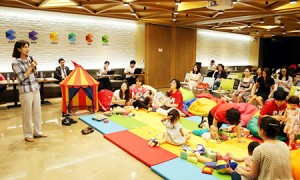- California Assembly OKs highest minimum wage in nation
- S. Korea unveils first graphic cigarette warnings
- US joins with South Korea, Japan in bid to deter North Korea
- LPGA golfer Chun In-gee finally back in action
- S. Korea won’t be top seed in final World Cup qualification round
- US men’s soccer misses 2nd straight Olympics
- US back on track in qualifying with 4-0 win over Guatemala
- High-intensity workout injuries spawn cottage industry
- CDC expands range of Zika mosquitoes into parts of Northeast
- Who knew? ‘The Walking Dead’ is helping families connect
Google Korea encourages mothers to run startup

A participant in Google’s ‘Campus for Moms’ program introduces the plans to run her startup business during a gathering at the Google Campus Seoul in Samseong-dong, southern Seoul, Tuesday. (Courtesy of Google Campus Seoul)
By Yoon Sung-won
Google Korea has launched a program to help mothers of young children establish startups.
Jeffrey Lim, the head of Google Campus Seoul, said that the program, dubbed “Campus for Moms,” has been organized for parents who had been too busy for childrearing to join a startup community. He stressed the program aims at promoting women’s economic activities.
“We have organized this program to make the information on startup establishment and management more accessible to mothers who seek to become an entrepreneur, and help them lead business innovations,” Lim said in his opening speech of the program at Google Campus in Seoul, Tuesday.
“The key point of this program is to provide the participants with opportunities to learn from those who have accumulated expertise and know-how, and to establish human networks with each other. I hope the first program will build a virtuous circle that promotes the startup ecosystem here.”
Google Campus has been established under the IT giant’s startup incubation initiative, “Google for Entrepreneurs.” Google Campuses are located in Tel Aviv, London, Madrid and Seoul to accelerate ventures in more than 120 countries, the company said.
Google Korea opened one in Seoul in May, and has attracted 6,700 registered members and organized learning and mentoring sessions where 5,800 participants from 56 countries have participated.
Citing research on market capitalization of NASDAQ-listed enterprises, Lim said those with well-balanced gender ratios tend to have a 30 percent higher market cap.
“This data shows that more active participation of women in society and economy leads to higher corporate value and performance,” he said. “Unfortunately in reality, women’s social and economic activity in Korea is still limited. We have devised this program to lower social hurdles and prejudices.”
Google Campus Seoul said about 20 participants to this program will attend five sessions scheduled from Tuesday through Aug. 12. Most of the participants are in the early stages of launching a startup and they will learn about ideation, product and service development, business planning and funding, branding and marketing through mentoring, it said.
As the program focuses on learning and networking, Lim said the participants can tap into the incubation center’s other programs for more detailed parts of running a startup.
“We hold other mentoring sessions about funding, which is an essential part of launching a startup, every month or two, and these events have attracted much interest from local venture capitals and investors,” Lim said. “Participants can have chances to meet with them and discuss possible business opportunities.”
During the first gathering of the program, participants introduced their diverse plans for businesses.
Yang Ji-hye, a participant who plans to launch a children’s clothing brand business, said: “After I stopped working to concentrate on childcare, I felt like I was losing presence in society. So I took this opportunity to open a lifestyle brand business that I have wanted to do.”
Another participant, Kim Kyeong-soo, said he plans a startup business that provides technological support for other startups in establishing websites or mobile applications to run the business.
“I aim to run what I call a tech capital, which provides technologies instead of capital. I plan to provide not just technological support, but also services to develop human resources,” Kim said.















